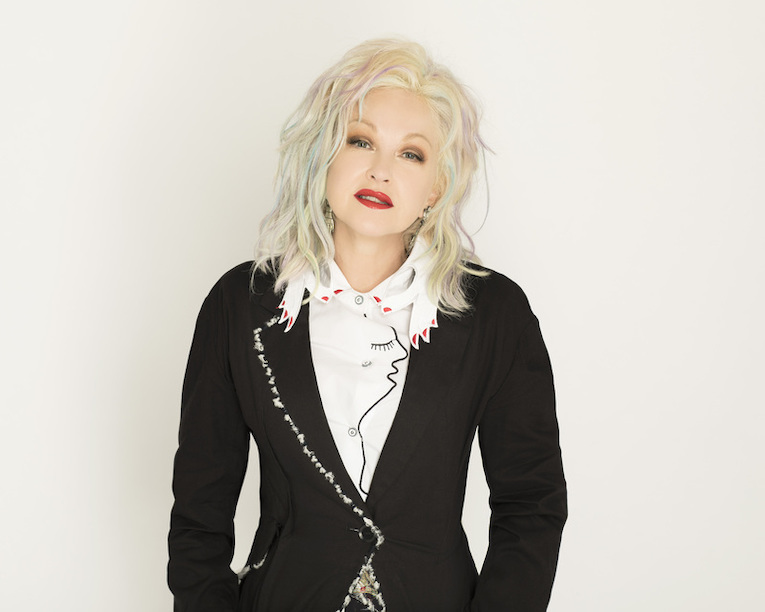
Photo: Cyndi Lauper, press photo
By Jay Luster
“By highlighting women who have made a difference in history, it opens up that world of possibilities to young girls.” Debbie Walsh, Director of the Center for American Women and Politics at Rutgers University.
Cyndi Lauper, best known for her flamboyant personal style and ridiculously powerful, four octave singing voice, in 1983 tapped into the heart of feminism with the power of a nuclear bomb. In October of that year, Record Plant dropped the album, She’s So Unusual. The first single from the record was a cover of the Robert Hazard song, “Girls Just Want To Have Fun.” Hazard’s interpretation featured a man longing for a bride, thwarted by frivolous party girls. Lauper reinterpreted it as an anthem for female self-actualization. So powerful was her message that, Ms. Magazine named her their 1985 Woman of the Year ”for taking feminism beyond conformity to individuality, rebellion and freedom.”
Fleeing an abusive step-father, Lauper left home at 17, never to return. While she reconciled decades ago with her mother, who appears in many of her videos, the tragedies she suffered along the way became a musical thread throughout her career. The loss of her friend who died of AIDS at 24, inspired her interpretation of her 1986 mega-hit “True Colors.” “Sally’s Pigeons,” a deep cut from her wholly underrated 1993 album Hat Full Of Stars, reminds us of the horror of back-alley abortions, and “A Part Hate,” points a capacious finger at the destructive pervasiveness of racism. Considering where our society appears to be heading, Lauper’s songs are, quite possibly even more legitimate now than they were in the 1980’s and 1990’s when they were first recorded.
Early on in her career, in a New York Times article, Cyndi Lauper was cast as a competitor to Madonna. The press wondered aloud, which of the two women would win the race. Of course, the finish line was never defined, and the competition was never real to begin with. Perhaps what the press was picking up on were the genuine commonalities implicit in their art. Like Lauper, Madonna took a frank look at life, and declared herself free from societal judgment. Her songs were a direct attack upon repressive American conservatism. Both women defiantly declared they wouldn’t be tied down by convention. Amplifying that assertion, Lauper told Gael Love in Interview Magazine “What you truly believe and what you genuinely feel, someone else will genuinely feel.” To the paparazzi, inspiring young women all over the world to take control of their own lives was a competitive sport. To Madonna, and Cyndi Lauper, it was about unapologetic feminism.
Throughout the centuries, there have been women in every conceivable artistic endeavor championing the cause of feminism, Lauper was different. With her thrift store, mismatched clothing, color-bright hair, exaggerated Queens, NYC accent, and Mighty Mouse persona, she exuded a sense of confident individuality never seen before. Her songs were about sad breakups, girl power anthems, angry observations about money changing relationships, and even masturbation. The song “She Bop,” despite its lyrical ambiguity, and cartoonish video, forced the topic of self-stimulation into the open and it made certain people mad, while others found it refreshing, and even amusing. Shortly after it came out, an organization called the Parents Music Research Center created a list they called the filthy fifteen. The PMRC was led by Tipper Gore, the wife of former VP Al Gore, and was funded by Beach Boy Mike Love, and beer magnate Joseph Coors. They used their political clout to approach Congress about censoring what they considered dangerous lyrics. “She Bop” made the list. The result of the hearings was a voluntary labeling system letting folks know what to expect once they peeled the cellophane off their LP and gave it a spin. Lauper, on the other hand, quipped the song had brought shame to her family.

Photo: Cyndi Lauper/Shutterstock
She’s So Unusual went on to become a 6x certified platinum record, and the tiny but powerful Cyndi Lauper, at age 30, became an overnight success. That led her to places, which in retrospect seem kind of weird. Professional wrestling manager, Captain Lou Albano appeared in the “Girls Just Want To Have Fun” video playing the part of her father. She began appearing with Captain Lou at wrestling shows all over the country, and it’s unclear whether it helped her sell records or not, but it was clear the girl was just having fun. Ultimately, the relationship with the wrestling world went south when Albano claimed publicly he was her manager. He wasn’t, and in the ensuing brawl wrestler Roddy Piper kicked the 5’3” 110-pound girl in the head. Once that detour was complete, Lauper went back into the studio and began work on her second album, True Colors.
Interestingly, Cyndi Lauper didn’t like the song “Girls Just Want To Have Fun.” She wasn’t happy about doing it to begin with, and despite it becoming a defining paean to women’s liberation, she never truly warmed up to it. She believed she didn’t have proper creative control over her own music, and battled with the record company about it. She had to fight to have her own songs, the emotional classic “Time After Time,” and “She Bop” included on her own record, and that simply wouldn’t do for True Colors. They apparently wanted to turn her into the next Barbara Streisand and all she wanted to be was Cyndi Lauper. After gaining control, she wrote, or co-wrote seven of the ten songs. Though she didn’t write the title track, her interpretation surprised and thrilled songwriters Tom Kelly and Billy Steinberg. Driven by the self-penned songs “Change Of Heart,” and “Boy Blue,” the record went on to peak at #4 on the Billboard charts, and sold seven million copies. More importantly, once it was learned who she dedicated the song to, the title track became accepted by the LGBTQ community. And when she wrapped herself in the rainbow flag at a concert in NYC, she became one of their primary spokeswomen.
Though her next two records didn’t sell as well as the first two, Cyndi Lauper has continued to be a smashing success. She won a Grammy Award as Best New Artist in 1985, and then followed it up in 2017 for Best Musical Theater Album for her score of the hit Broadway play, Kinky Boots, for which she also won a Tony. In 1995, she won an Emmy for Best Actress In A Comedy Series for her work on the show Mad About You with Helen Hunt and Paul Reiser. In 2019, she was awarded an honorary Doctorate Of Letters by Northern Vermont University-Johnson after having attended there well before her singing career began. During her commencement address, she jokingly asked the graduates if anyone was feeling ill because she was a doctor. The list of awards and honors she’s picked up along the way are simply too long to list, but having come from a dark place early in her life, like the lyrics from her least favorite song, Cyndi Lauper really did become the one to walk in the sun.
Cyndi Lauper website

Leave A Comment